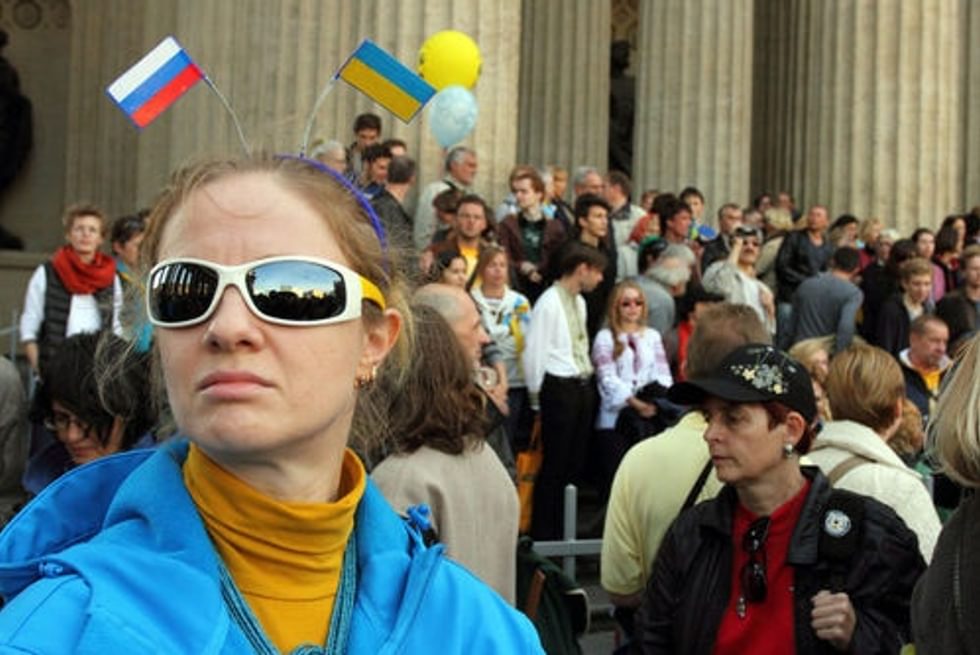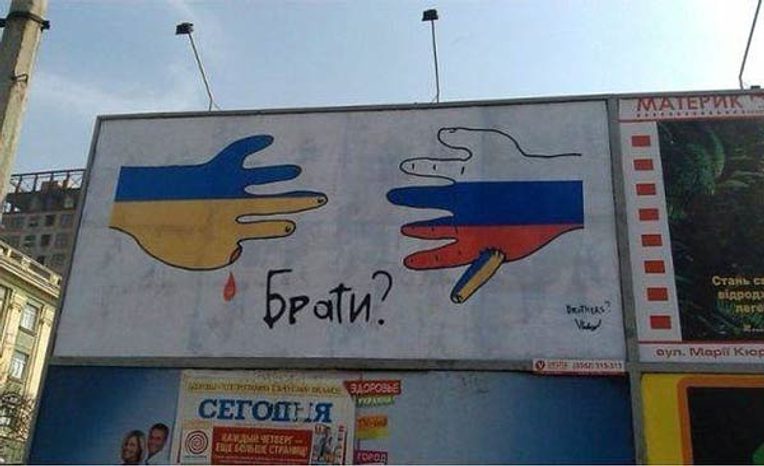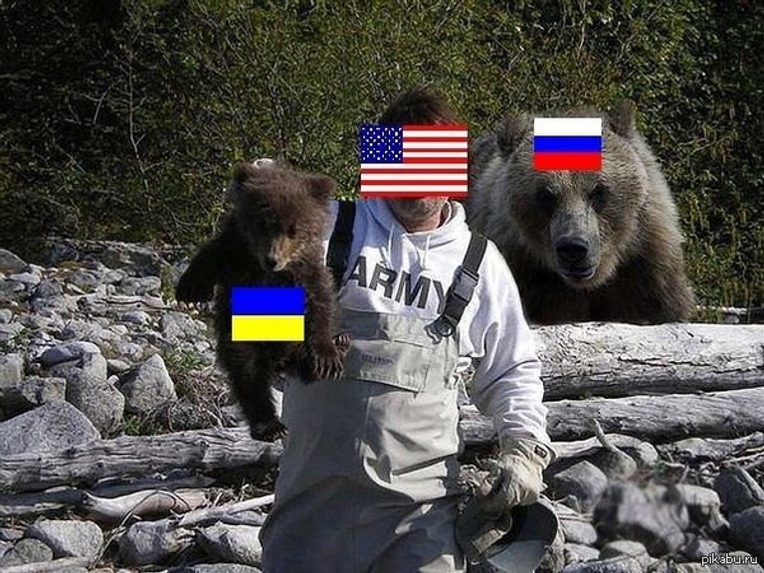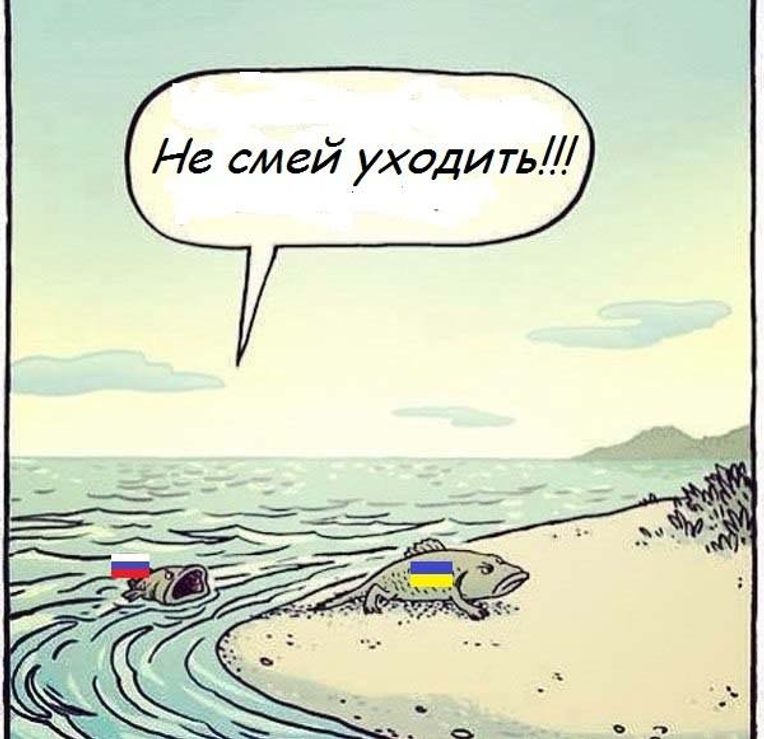Brother Nation or Brothers No More? Seeing Asymmetry in Post-Maidan Ukraine
From the Series: Ukraine and Russia: The Agency of War
From the Series: Ukraine and Russia: The Agency of War


“Although I was educated after Independence, my education was a typical Russian-Soviet one. I grew up raised on Russian films, on Russian music, on Russian books; for a long time I considered Russia a friendly country, a kindred country. But now all of that is in the past. Now my tongue, the tongues of my nearest and dearest, of millions of Russian-speaking and ethnic Russian people in Ukraine, will never be able to call you a ‘brother nation’ again.”—Denis Kazanskij “A Letter to Russia from Donetsk” (July 14, 2014)
In a recent article, Cathy Wanner (2014) discusses the poor fit between the Russian legal mandate to protect the interests of Russian “compatriots” on foreign soil and the fluid practical realities of linguistic and religious identities in Ukraine. The Russian word sootechestvennik (“compatriot”) is founded on morphemes of shared parentage, and Wanner argues that this familial paradigm has served as the basis for “crypto-colonial” relations between the two countries, wherein Russia justifies intervention in and attempts to control Ukraine as stemming from “concern” for ethnic Russians as a “brother nation.” This unitary “fatherland” or “motherland” thus begets bratskie narody (“brother nations” or peoples). While the term bratskij narod functions reflexively, placing nations in a relationship to each other, this reflexivity hides an inherent asymmetry in the hierarchical nature of the underlying expectations of this brotherhood of nations.

Russian cartoons and memes about Ukraine that emphasize fraternal relationships frequently represent Ukraine as a bear cub who is rescued from association with dangerous elements (most frequently the US, the EU, and radical Ukrainian group Right Sector) and brought back under control by the protective form of adult Russia. Russian images that instead emphasize Ukraine’s rejection of this relationship often portray Ukrainians as irresponsible youngsters1 or pigs who eventually realize the West will not pay their bills. When presented as humans, they may be aggressive men dressed in Ukrainian garb and assaulting Russian speakers or, less frequently, a promiscuous woman abandoning a stable heterosexual partnership with Russia.
In contrast, Ukrainian graphics about Russia, such as the one at the head of this page, have tended to reference the metaphor of brotherhood as a failed or rejected family relationship. One visual that circulated widely in the wake of Russian troops appearing in Crimea was a photo of one such “little green man” in camouflage, carrying a machine gun, superimposed with the statement “Brother? Brothers don’t visit brothers this way. A brother doesn’t wipe his feet on his brother.”2 Other images focused on Ukraine’s attempts to leave behind a dysfunctional, abusive, or simply outmoded family relationship with Russia. These two interpretive frames of a familial relationship, positing on the one hand Russia as an older brother and Ukraine as a wayward child and, on the other, Russia as an abusive relative being left behind as Ukraine moves on to healthier relationships nonetheless both reflect a growing awareness of asymmetrical power relations embedded in the two different ways of framing Russia and Ukraine in a fraternal relationship.

These asymmetries, once tacitly accepted by many Ukrainians who did not consider themselves nationalists, are now highlighted in deliberate contrasts that become interpretive devices in and of themselves. Nowhere is this more evident than in humor that turns on revealing these asymmetrical relations. For example, in the process of ridiculing Russian internet trolls, a series of one-line jokes that circulated as a “Manual for Workers in an Olgino basement”3 also serves to bring to the fore the foundational assumptions of asymmetry. These assumptions effectively limit the interchangeability of the terms “Russian” and “Ukrainian” in ways that tacitly assert the status of Russian as the unmarked,4 default standard against which Ukrainian behavior is marked as suspect and radically nationalist. For example, one of the jokes reads: “If Putin speaks Russian he is simply Russian. If the Ukrainian president speaks Ukrainian [instead of Russian] he is a fanatical Ukrainian nationalist.”5 The series of one-liners ends by making the hierarchical component of the asymmetry apparent: “If Putin’s government disagrees with the Ukrainian government, they are asserting their national interests. If the Ukrainian government disagrees with Putin’s government—they’ve ‘totally forgotten their place’.”6 The closing phrase here, abarzeli vashche parodies casual Russian pronunciation,7 a strategy widely used in recent Ukrainian humor to create distance between the joker’s voice and that of an imagined, affronted, Russian.8 The tag line abarzeli vashche spawned further humorous riffing9 in which everyday activities and objects are ridiculously marked as a threat to established social order between brother nations.
Prior to Maidan, recognition and repudiation of the marked relations and implicit hierarchies in terms like bratskij narod have, unsurprisingly, been associated with a Ukrainian nationalist stance that by extension rejected the metaphor of blood relationship in favor of an interpretive frame of forceful colonial domination of Ukraine by Russia. Before Maidan, the annexation of Crimea, and the war in Donbas, this interpretative framework, while not marginalized, was associated with a Ukrainian nationalist position that had not been adopted widely or evenly by Ukrainian citizens throughout the country. In the post-Maidan, post-Russian aggression world of 2014, this interpretive lens has become more mainstream and gained traction as a “pro-Ukraine” stance, with many more Ukrainians of all ethnic backgrounds aligning with it. In this process, the transformation of a “nationalist” interpretive lens into a “pro-Ukraine” or “patriotic” lens has created a situation in which the diversity of civic-based Ukrainian identities is being elided by a wave of patriotic fervor. It is thus worth cautioning that the emergence of a broader, unified rejection of Russian representations of Ukrainians as irresponsible, fickle, and easily swayed by Western lies and far right nationalist groups should not be mistaken for a unified embracing of a fully shared nationalist narrative of “Ukrainian-ness.”
Indeed, for many Ukrainians the loss of a larger, unspoken regional identity, that sense of being “brother nations” remains a shocking dislocation, as evident in the excerpt of Donetsk blogger Denis Kazanskyj’s raw open letter to the Russian people with which I began this essay. In the field in May 2014, the sense of betrayal was palpable in my conversations with Ukrainians from widely ranging backgrounds. In one such conversation, sitting in a park near her workplace in late May, Anya spoke of a difficult winter spent juggling two jobs and trips to the Maidan to support protesters. A Russian-speaking professional in her late twenties, she explicitly refuted the idea that Russian speakers have not enjoyed equal rights in post-Soviet Ukraine. The pressure to choose between exclusive, rather than overlapping identities, came, she claimed, from Russia itself: “We never had that kind of choice put in front of us before: Ukraine or Russia. It was always ‘we are all the same.’”10 The asymmetries of ethno-political hierarchies, the knowledge that we are not “all the same,” once seen, can be difficult to unsee, and the familial narrative, once undermined, may, in the end, separate Ukraine more completely from Russia than autonomous regions or trade associations ever could.
1 The text reads, “Wake up Cinderella. The Euroball is over and now the real fun awaits you.” (Obama is holding a bar tab).
2 “Брат?Брат кбрату в гости так не ходит.Брат об брата ноги не вытирает . . . ”
3 “Olgino basement” is a reference to an exposé about office workers in a St. Petersburg, Russia suburb paid to spend their days “trolling” by posting pro-Kremlin, and often provocative, comments on blogs and articles.
4 See Jakobson (1990, 317–18) for a discussion of markedness and semantic categories. Here I am following others including Lakoff (1975) in linking marked relations and asymmetries that reveal hierarchical social relations. See also Brubaker et al. (2006) for a compatible discussion of ethnic markedness in a mixed Romanian/Hungarian setting.
5 “Если Путин говорит на русском языке он просто русский. Если украинский президент говорит на украинском языке он Петлюра недобитый.”
6 Если правительство Путина не соглашается с украинским правительством оно отстаивает национальные интересы. Если украинское правительство не соглашается с правительством Путина—абарзели ваще.
7 The target phrase would be “oborzeli voobshche,” roughly “entirely lost their sense of place in the hierarchy.”
8 It should be noted that similar devices are used by humorous Russian media in producing “Ukrainian” speech.
9 The linked photo shows workers laying paving stones. Paving stones were used as a makeshift weapon during the Maidan protests. The text, which also makes fun of Russian pronunciation of the word “Banderovite” reads: “In the center of Kiev Banderovites emboldened by being treated with impunity are caching weapons in broad daylight, right in the middle of the street.”
10 Interview, Kiev, Ukraine, May 30, 2014.
Brubaker, Rogers, Margit Feischmidt, Jon Fox, and Liana Grancea. 2006. Nationalist Politics and Everyday Ethnicity in a Transylvanian Town. Princeton, N.J.: Princeton University Press.
Jakobson, Roman. 1990. On Language. Edited by Linda Waugh and Monique Monville-Burston. Cambridge, Mass.: Harvard University Press.
Kazanskij, Denis. 2014. “Письмо в Россию из Донецка.” Українська правда. Accessed July 14, 2014.
Lakoff, Robin. 1973. “Language and Women’s Place.” Language in Society 2, no. 1: 45–80.
Wanner, Cathy. 2014. “‘Fraternal’ Nations and Challenges to Sovereignty in Ukraine: The Politics of Linguistic and Religious Ties.” American Ethnologist 41, no. 3: 427–39.